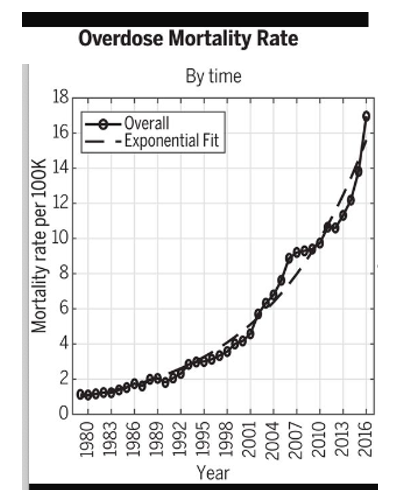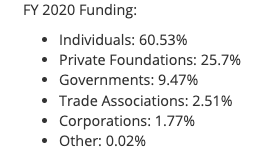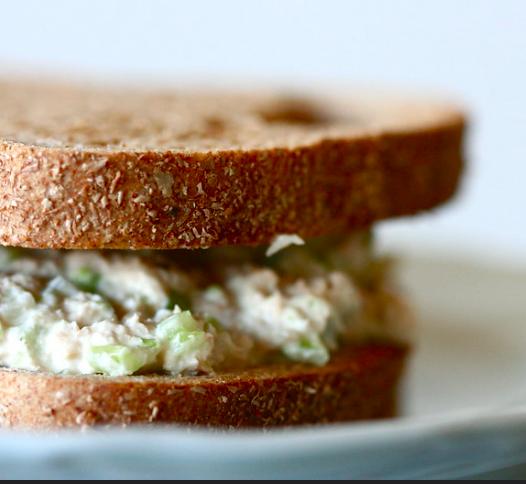Why start an article about a serious debate on a serious topic – whether overprescribing opioids caused today's overdose crisis – with a joke title? It's because the debate (video included in the link) I attended at the Sheen Center between Dr. Jeffrey Singer and Dr. Adrienne Fugh-Berman was a joke, just not a very funny one.
It was slightly more "debate-ish" than a political debate, where no one even attempts to answer questions, since Dr. Singer, a practicing surgeon for 35 years, at least tried to refute some of the ridiculous claims that Dr. Fugh-Berman, an academic who has not seen a patient in more than 25 years (1), made. In contrast, Fugh-Berman stuck to a simple script: opioids are ineffective and dangerous drugs that have become a plague on our country simply because greedy drug companies "tricked" physicians into writing too many prescriptions. Fugh-Berman used variations of this theme to answer the many questions she could not handle.
Although I will be writing about this event in more detail, here are some highlights and lowlights. Bear in mind that the transcript was not formally released (perhaps you might want to ask Reason Magazine, the host, why this is). Instead, you'll read a transcript that was generated using Apple's Transcribe Screen to Text app and lightly edited for clarity and to correct obvious transcription errors. There will still be errors present.
Four Revealing Moments
1. Fugh-Berman claimed that doctors could be manipulated into prescribing drugs by gifts, even as small as a pen. Or a tuna fish sandwich.
Fugh-Berman:
"A lot of the techniques that pharmaceutical companies use are actually pretty conventional sales techniques. They have some specific ones as well. ... most physicians don't have a sales background. They don't come from families that have sales backgrounds (2). They don't, you know, recognize these kinds of techniques. And, we're very, very smart in some ways, but more might be sort of lacking in some street smarts..."
"So it turns out that small gifts actually work much better than big gifts. So there's a great social psychology experiment in which they had students do like a really boring task...And then afterward, they said to the students we'll pay you to tell the next student, this was interesting experiment. But what happens is [the students] actually changed [their] thinking in order to reduce that cognitive dissonance. I'm like, I'm not the kind of person who can be bought off by $5 or [by a] tuna fish sandwich. You actually change your thinking. Those small gifts are extremely effective."
Singer:
"I think you sell us clinicians short. Do you think we're that stupid? That the opioid sales rep comes to my office and gives me all these papers, maybe even gives me a pen. ... [and] all of a sudden, I'm going to start prescribing opioids at that because this guy gave me [a] pen? How can I say, no, we're not that [dumb]. We are critical thinkers just like research physicians... [In] 35 years as a clinician, [I take] care of patients and [have] dealt with life and death situations. I find that offensive, to be honest with you."
2. Dr. Singer poses a hypothetical question, should we be rid of opioids altogether?
Singer:
Dr. Fugh-Berman, so based upon the resolution that overtreating with opioids caused the overdose crisis, would you then say that if we completely stopped all opioid prescribing--got it down to zero--the overdose rate is gonna start to come down?"
Fugh-Berman:
"I mean, it's unreasonable to think that the opioid prescribing rate would come down to zero because, of course, some opioid prescribing is this perfectly legitimate for end-of-life care for cancer-related pain et cetera. But yet it [is] over-prescribing has fed this epidemic and will continue to feed this epidemic. There's a bit of a lag ... about eight years from when someone starts prescription opioids, to when they start using heroin. But the epidemic that we have here is an addiction epidemic, and it is, and then when people end up on the street, that's when they're being exposed to these dangerous drugs... So yes, absolutely. [If] we were to lower the rate of opioid prescribing. It would also lower the risk of addiction and overdose."
[It would be interesting to hear Fugh-Berman's explanation for the following graph. Please tell me if there is any indication that further cutting opioid prescribing would prevent overdose deaths].

Since 2012 opioid overdoses have been inversely related to rates of prescription of legal pain medications. It does not take a vivid imagination to foresee what will happen if prescription rates are decreased further —source: Skeptic, CDC.
How about this graph showing overdose mortality rates dating back to 1980? Does it in any way support Fuch-Berman's thesis about opioid contribution to drug deaths?

Source: Burke, et. al., "Changing dynamics of the drug overdose epidemic in the United States from 1979 through 2016" Science, 21 Sep 2018, Vol 361, Issue 6408. DOI: 10.1126/science.aau1184
3. I ask a question of Dr. Fugh-Berman (Is she lying or merely ignorant?)
(From me during the audience question period):
"My name is Josh Bloom from the American Council on Science and Health. [Our] motto is 'we debunk junk.'... I just want to call you out on one number. [It] was the [103,000 overdose deaths]...I've called out [other] people in writing for playing a trick; that trick is combining the [deaths from] legal pill prescriptions with [those from] fentanyl to come up with a number that [makes the pill deaths look] artificially high. It would be like combining submarine and automobile accidents to describe how dangerous [submarine] transportation [is]...My question is, are you aware that this number (103,000) is misused to paint a different picture than it is really going on? Because fentanyl, of course, [is responsible for most overdoses]."
Fugh-Berman:
So the number is actually over 107,000 overdose deaths in 2021. That's the CDC ...number and includes overdoses from not just opioids but of all drugs, including methamphetamine, including cocaine, etc. So [about 75%] were due to an opioid. Many of those are due to fentanyl. There's a very dangerous illicit fentanyl supply, and that's not the least bit, um, misleading since, as I've explained, the people who are dying from fentanyl are using heroin, and they're using heroin because many of them started off with prescription opioids and then had to go to the streets to get 'em heroin. And we'll also point out that the American Council on Science and Health is very heavily industry-funded." [Emphasis mine]
Oh, really?
When people or groups cannot refute our science, they routinely play the "industry-funded" card to discredit us and avoid addressing what we claim. As a non-profit, we must file a 990 Form (similar to a 1040 form for personal income tax). Our 2020 total revenue was $1.3 million. Here is the breakdown of donations for our "very heavily industry-funded" organization (3).

Source: ACSH 2020 990 Form
Let's do some math. Our corporate funding in 2020 was a whopping $23,000. If you throw in contributions from trade associations, add another $32,600. Does $56,000, none of which came from drug companies, make us very heavily industry-funded or lacking in credibility? No, it is Dr. Fugh-Berman who lacks credibility in making this claim.
4. ACSH "follows the science." Does Dr. Fugh-Berman "follow the ambulance?"
While ACSH is always scraping for donations, the same cannot be said for Fugh-Berman; a fact she made perfectly clear in court when testifying against Johnson & Johnson in a lawsuit in San Diego about a pelvic mesh device in 2019:

Source: Northern California Record
If my math is correct, Fugh-Berman earned about five times that of our annual industry funding (twice, if you count the trade groups too) working 240 hours helping lawyers sue a drug company, and this is only one case. So, it is fair to say that while we are very poorly industry-funded, she is very well "anti-industry funded." However, it is difficult to say to what extent since I cannot find any other indications of what Fugh-Berman actually earns. Perhaps "litigation industry-funded" is more accurate.
In search of hypocrisy
Along these lines, in 2011, she issued a correction in BMJ:
"I inadvertently neglected to disclose that at the time of the publication of this article, I was a paid expert witness in litigation regarding pharmaceutical marketing practices."
The article in question was "Doctors must not be lapdogs to drug firms" BMJ 2006. Note the date of the publication - 2006. Apparently, Fugh-Berman "remembered" five years after the "Lapdog" article was published that she had a conflict of interest. Her memory is either very good or very bad.
Who are you going to believe?
My statement of competing interests: I know Dr. Singer well and have worked with him numerous times on opinion pieces. He is a fine, honest, and compassionate man by every measure.
I don't care about who "won" the debate. Who is more credible? A long-time surgeon who makes no money from any drug company; motivated by compassion for his patients in pain or an academic whose motivation is... you tell me. What she said about ACSH alone makes me wonder how accurate she is in other statements.
From where I sat, the real debate was about the credibility of both Singer and Fugh-Berman. Now, knowing what you know, it's time to cast your vote.
NOTE:
(1) State ex rel. Hunter v. Purdue Pharma L.P. NO. CJ-2017-816 (Dist. Ct. Okla. Cleveland County Ct. Jud. Dist. 21 Aug. 26, 2019)
(2) Let me get this straight. Neither my father (he was a dentist) nor I (a scientist) had any experience working in a slaughterhouse. Does this mean I can't figure out how to order a hamburger? What a stupid argument.
(3) At ACSH, we keep a firewall between writers and fundraising to keep us from potentially being influenced because of a donation (or lack thereof). We have no financial incentive to write (or avoid writing) about anything whatsoever.



